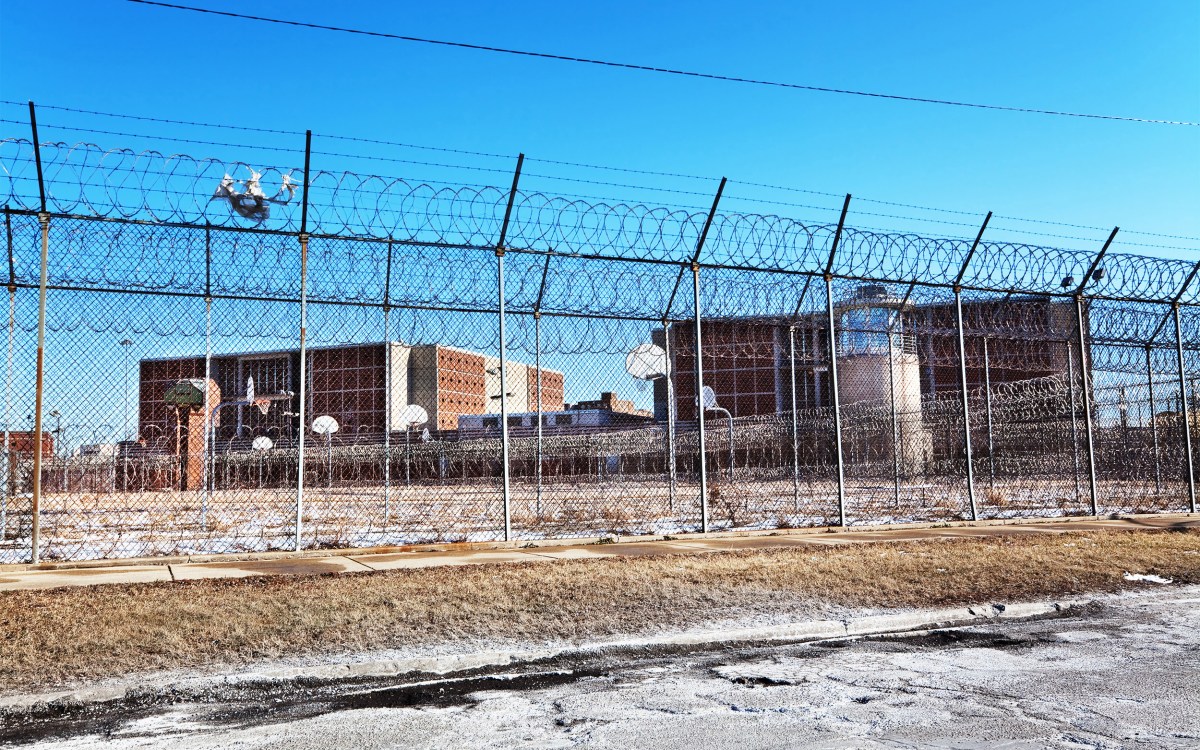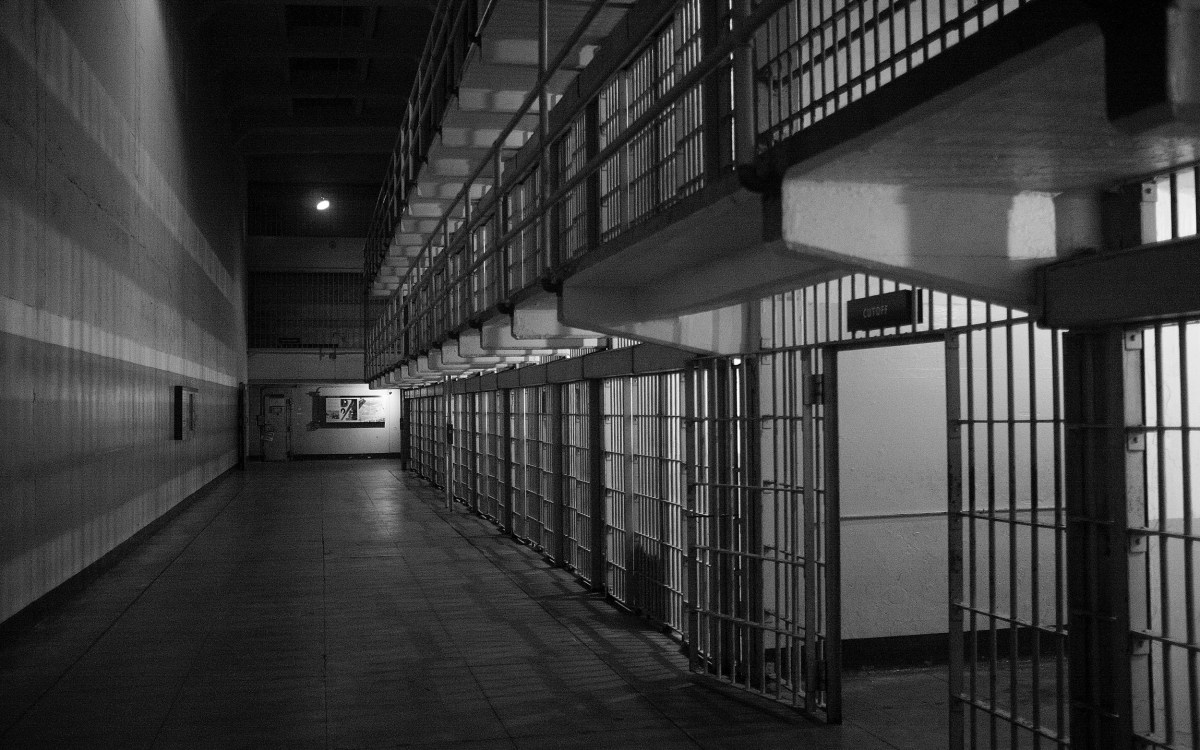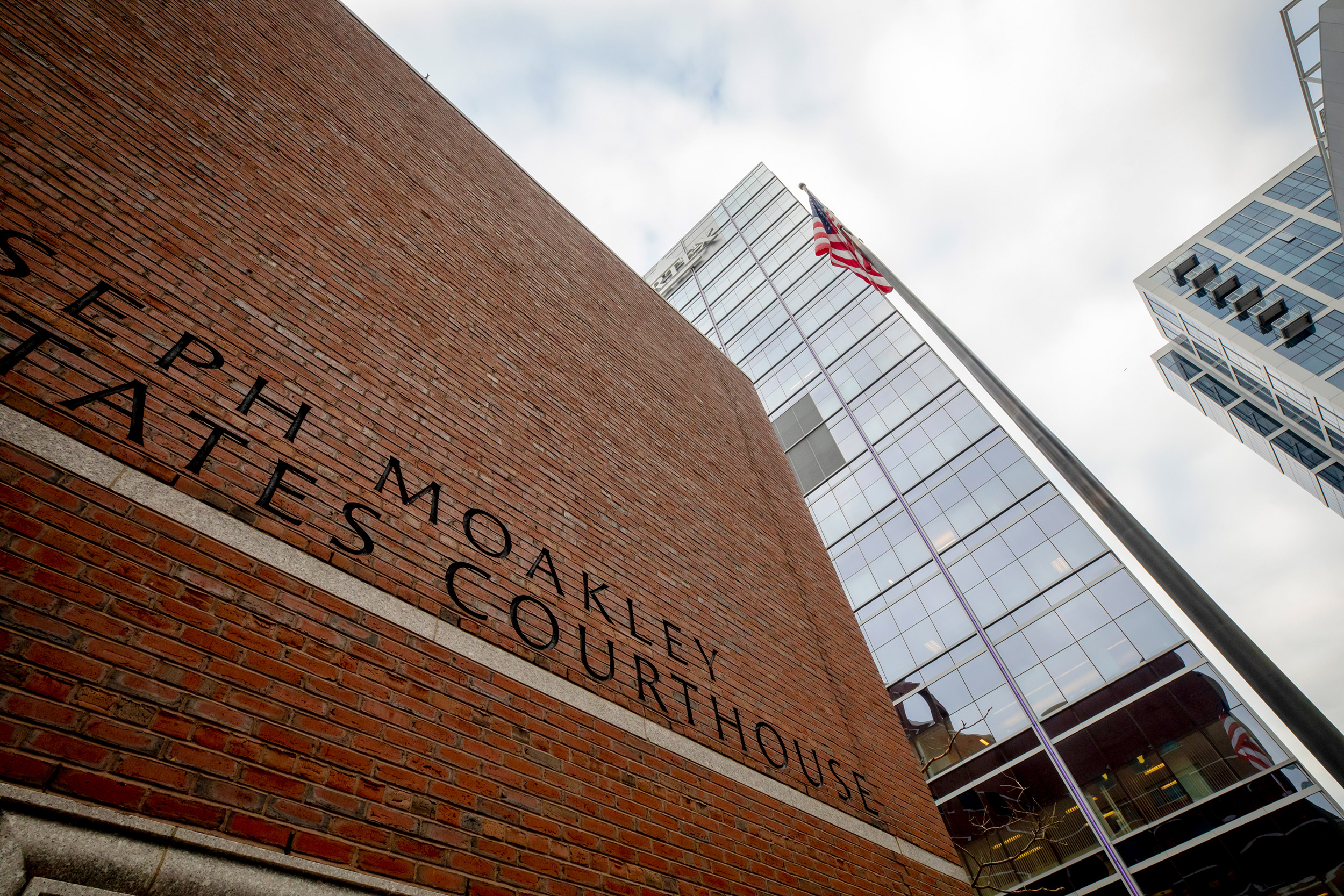
Boston’s Moakley Courthouse.
Rose Lincoln/Harvard file photo
Dissecting racial disparities in Mass. criminal justice system
Law School program’s report analyzes why Black, Latinx people are overrepresented, get tougher sentences
A new report by the Criminal Justice Policy Program (CJPP) at Harvard Law School shows that Black and Latinx people are overrepresented in Massachusetts’ criminal justice system and that they receive longer sentences than their white counterparts when convicted. The analysis, “Racial Disparities in the Massachusetts Criminal System,” was the result of a 2016 request by the late Ralph Gants ’76, J.D. ’80, chief justice of the state Supreme Judicial Court, for the Law School to take an in-depth look at the problem. The authors include CJPP Executive Director Brook Hopkins, J.D. ’07, and fellows Elizabeth Tsai Bishop, Chijindu Obiofuma, and Felix Owusu. The Gazette interviewed Hopkins and Owusu, a Ph.D. candidate in Public Policy at the Graduate School of Arts and Sciences, about the disparities and the need for policy reforms.
Q&A
Brook Hopkins and Felix Owusu
GAZETTE: What triggered the request by the chief justice of the state Supreme Judicial Court for the study?
HOPKINS: In the fall of 2016, Chief Justice Ralph Gants gave a speech called “The State of the Judiciary” highlighting research that showed that Massachusetts had some pretty stark racial disparities in its prison population. Chief Justice Gants asked then-Dean Martha Minow if Harvard would do a study to shed some light on where those disparities came from. Dean Minow asked my organization, the Criminal Justice Policy Program, if we would head up that study. We worked with a coalition of folks across the School to do a very deep dive into administrative criminal justice data in Massachusetts. This report is the culmination of that.
OWUSU: I joined the effort in early 2018, and there had already been some work collecting data from various sources. Over the course of the past three years, in addition to analyzing the data, a lot of effort went into merging data sets from different agencies, be it the trial court or the Department of Criminal Justice Information Services or the Department of Corrections. We had to make sure that the data sets from different agencies could all be in communication with each other. This project was a collaborative effort because we needed insight from people who work in the criminal justice system to incorporate a variety of perspectives in the report.
GAZETTE: Let’s talk about the report’s findings. You were asked to explore the reasons behind the great disparity in the rates of imprisonment among whites, African Americans, and Hispanics. What did you find?
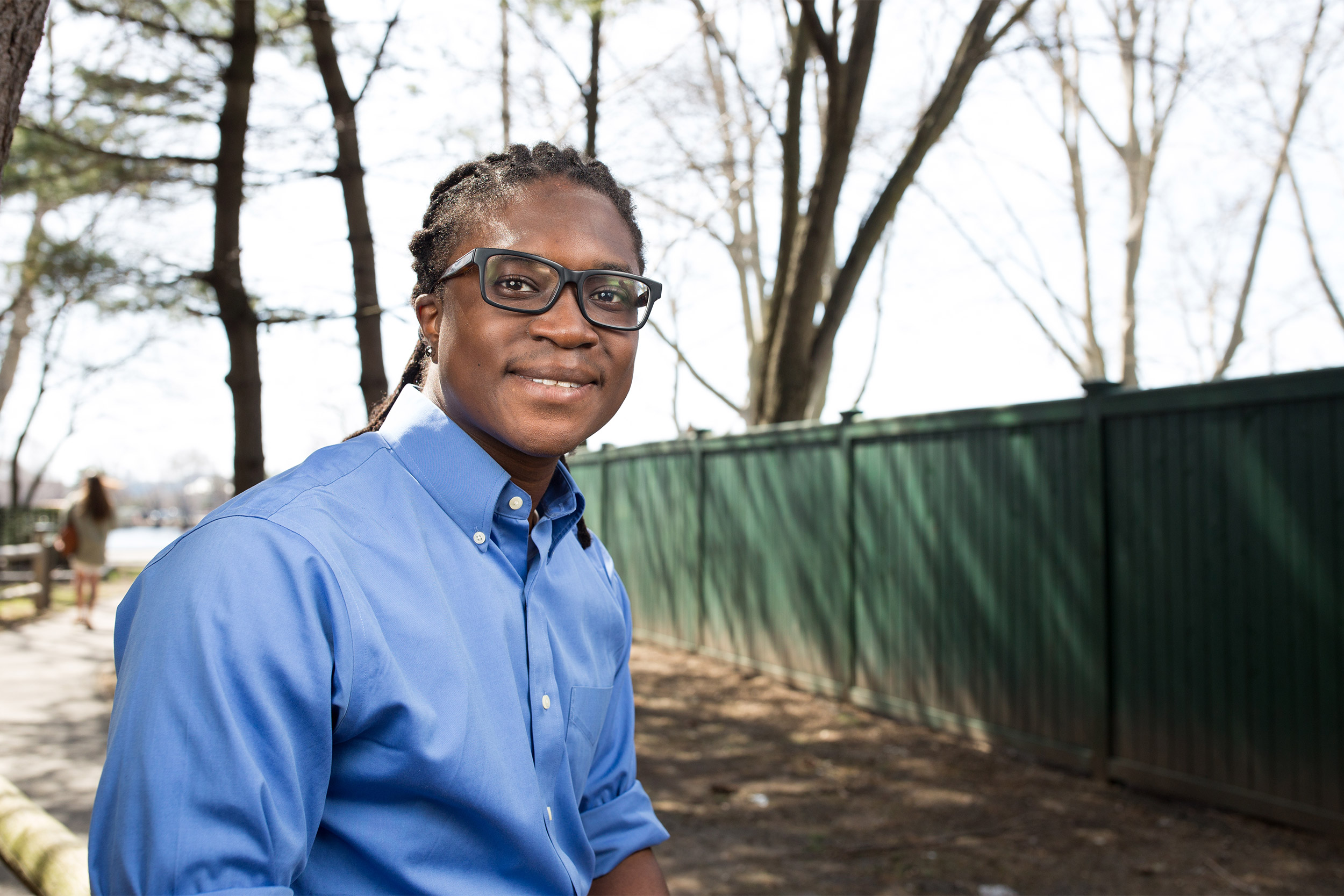
Felix Owusu, study author and a Ph.D. candidate in Public Policy.
Courtesy of Felix Owusu
OWUSU: There is a general understanding that racial disparities exist in the criminal justice system. Our goal was to look at the different points in the process that led to that outcome to find out where we need to intervene to change that outcome. That is what this report really speaks to. One of the things we did was take information from agencies where these databases were not in conversation with each other and were not regularly linked or merged to be able to look at things across people’s criminal history, their charges in the case that they’re in, and their incarceration sentences. The value of this report is being able to speak to multiple stages of that criminal justice process that led to those stark outcomes. That’s why this kind of analysis is important even if there’s already a general understanding that there was a problem with regard to overrepresentation.
It’s a 100-page report that analyzes data on over half a million cases. It’s hard to highlight every important trend. But I’d like to highlight a couple of takeaways. First, we were able to confirm that people of color are overrepresented across all stages of the criminal system relative to their share of population in the state. Although our data focuses primarily on what happens in court, the disparities are already large by the time people show up in the data that we analyze. Second, we found that Black and Latinx people receive much longer sentences on average than their white counterparts. We found that one of the decision points that was particularly impactful in generating this disparity was in the initial charging decisions made. The last thing I’ll say is that racial disparities were particularly extreme for defendants facing drug and weapons charges. Black and Latinx defendants facing drug and weapon charges were more likely to be convicted, more likely to be incarcerated, and receive longer sentences than white people who were facing similar charges. Given what we know from history and past research, these findings might not be very surprising for people, but I think it was important to document it and show that that is an essential component to understanding racial disparities in the criminal justice system.
GAZETTE: What were the challenges in the process of collecting the data from state agencies?
HOPKINS: What really surprised me in the course of doing this work was how difficult it was to get the data and get it to a place where we could analyze it. For instance, we were unable to get data from prosecutors’ offices or obtain sufficient data from police and law enforcement. Nor could we get final conviction offenses for most of the people in our data set or get data about judges or prosecutors. We got data about probation, but we were unable to use it because it didn’t link up to a sufficient number of trial court cases. There were a lot of problems with the data, which made it extremely difficult to even get to the end stage of findings. It took a lot of work to get there, and this is information that we should be able to know, as citizens of Massachusetts, that we just can’t know because there is no data.
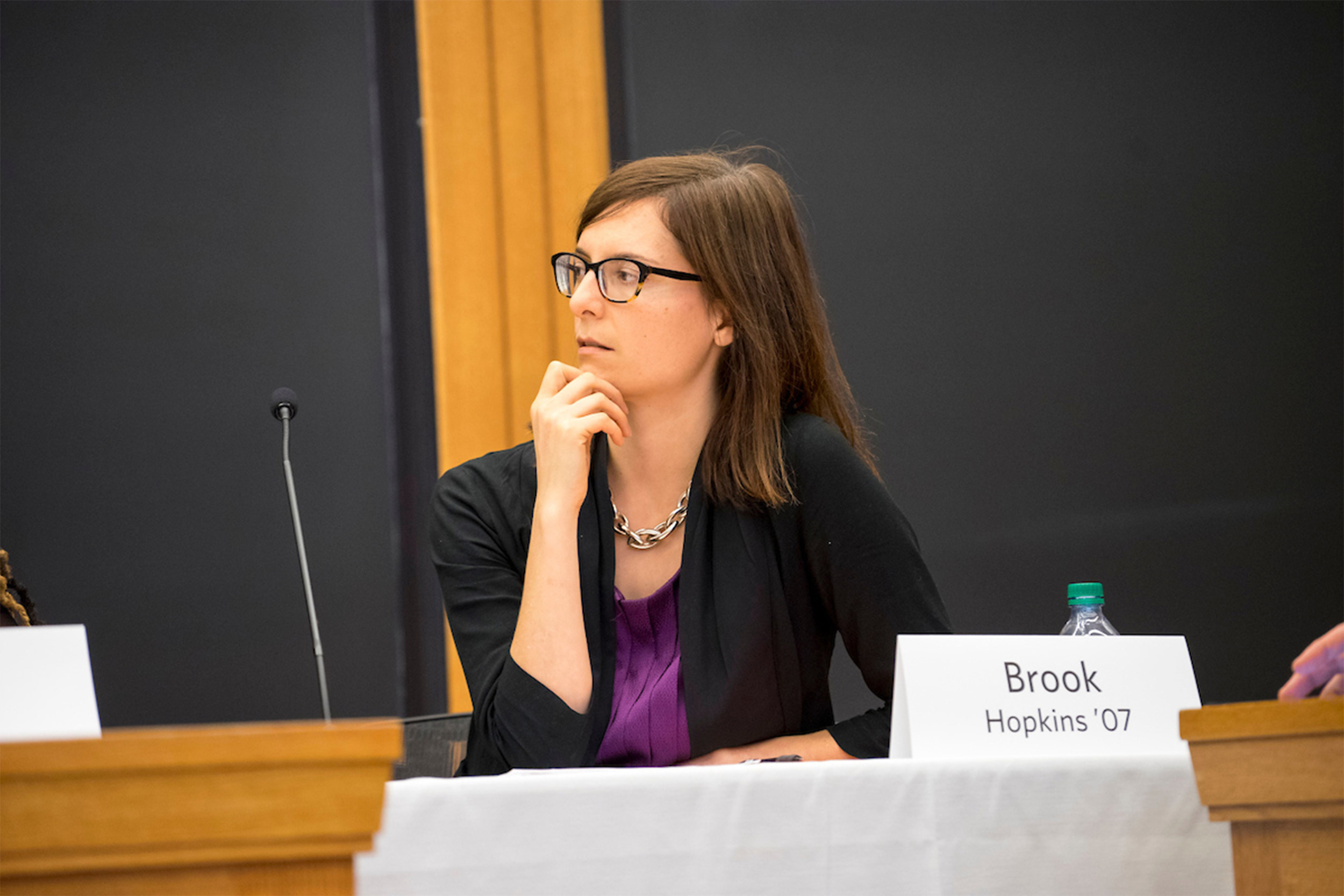
CJPP Executive Director Brook Hopkins, J.D. ’07.
Photo by Steve Gilbert
The challenges were many. These data sets are meant for operations management, not for research of the kind that we do, and it takes a long time for the agencies to even collect the data that we were asking for. One challenge is how much time it took to even get the data. We were trying to track the whole process, and we were getting data from various agencies. It took quite a lot of work to link up the data from the various agencies — to be able to link up somebody’s trial court record with their criminal history or with their probation record or their Department of Corrections record. Also, some of the agencies use different terms or fields to mean the same thing or have different definitions. We had to understand the idiosyncrasies of the various agencies, and once we had the data, we had to understand what the various fields meant. Some of that was self-evident, and some was not, which made it hard to figure out how to interpret what we were seeing. And then there was a lot missing, and we didn’t know whether it was missing because it didn’t happen or because it was not recorded. There are some things that are not tracked at all. For instance, there’s no way to tell when a person is arraigned in District Court and whether they’re subsequently indicted in Superior Court. There are two separate records, and there’s no link between them. In District Court, it looks like the case was dismissed and a new case is filed in the Superior Court, but they’re not linked at all. Keeping track of cases throughout the system was difficult in that sense as well.
OWUSU: Another challenge was to make sure that we were interpreting everything correctly and that it reflected the reality on the ground. It’s one thing to look at a data set at your computer, but we had to make sure that the data set reflected people’s experience. It took a lot of time and conversations with people who were familiar with these processes because when you’re trying to understand all of the cases in an entire state over three years, you have to be able to translate that information from how it’s written to be used day to day to an aggregate level.
GAZETTE: What contribution does the report make in the debate about racial disparities in the criminal justice system?
OWUSU: As a researcher who works with data, I think data is an important way of understanding the world and looking at the impact of policies on people’s lives. In this specific case, this kind of data helps us understand the impact with regard to racial disparities such as what charges are being levied against who and where, and what sentences apply to the charges. It’s also a key input in terms of how we can be able to hold our institutions accountable. By having information and data available we can improve public policy and make sure government works the way citizens want. I’d also like to highlight the state’s participation. It’s not often that an effort of this scale is undertaken to understand this kind of data. This is one step in a multistep process of understanding our criminal justice system through data and using this to do better.
“It’s one thing to look at a data set at your computer, but we had to make sure that the data set reflected people’s experience.”
Felix Owusu
HOPKINS: Another contribution is that the report reveals how institutional racism permeates the whole criminal justice system and ends up playing a big role in the racial disparities in incarceration rates in the state. It’s not just disparate treatment by police, prosecutors, or judges once somebody is in the system. There is also a legislative piece. We have certain behaviors that are considered a risk to public safety that are treated differently based on stereotypes about who engages in those behaviors. We have an example in the report of OUIs [operating under the influence]. In the data we analyzed, people charged with OUIs are overwhelmingly white. There is a statutory diversion program in the Massachusetts Code that allows for a first-time OUI offender to take an alcohol-education course, have probation, and then have the charge wiped from the record if they comply. In our report, we compare that to possession of an unlicensed firearm, which is a crime that is charged against Black defendants more frequently and has a pretty high statutory minimum sentence that escalates as subsequent charges are brought. The decision to treat one behavior so differently from the other is a legislative one. It’s not about systems, actors, and individual cases. I think the report in some ways challenges us to look beyond the treatment of individuals in the system and think more broadly about how we use the criminal system to address public safety and public health.
GAZETTE: What do you hope to achieve with this report?
HOPKINS: It’s important to remember that this is a report requested by the courts. That indicates that there is some interest on behalf of the courts in addressing this problem. I hope this report sheds some light on the nuances of the issue and will provide some ammunition to the courts and to advocates in thinking about how to prioritize policy change. I would also add the report concludes that there is some work to be done on data collection and accessibility and transparency to have a better understanding of what’s happening in Massachusetts.
OWUSU: We’re looking at the criminal system of an entire state over a long period of time. To fully address these problems is going to require multiple policy changes to happen because a lot of the disparities we see in this system occur before people enter the court system. The report speaks to the need to consider policies outside of the courts entirely, such as how we structure our communities, economically, socially, how we police our communities, and what kinds of activities to criminalize at all. This is of course being discussed nationwide. Thinking of how we can broaden the scope of things outside of the criminal justice response and include a public health framing or economic justice framing is very important.
This interview has been condensed and edited for length and clarity



